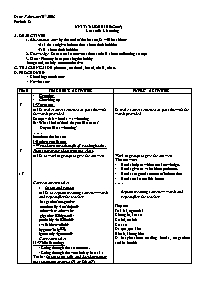Bài soạn môn học Tiếng Anh lớp 11 - Period: 81 - Unit 13: Hobbies (cont') - Lesson 3: Listening

A. OBJECTIVES:
1. Educational aim: by the end of the lesson, Ss will be able to:
-Ask for and give information about their hobbies
-Talk about their hobbies
2. Knowledge: Sts can make conversations and talk about collecting stamps
3. Skills: Fluency in expressing the hobby
Integrated, mainly communicative
C. TEACHING AIDS: pictures , textbook, board, chalk, chart.
D. PROCEDURE:
- Checking attendance:
- New lesson:
Bạn đang xem tài liệu "Bài soạn môn học Tiếng Anh lớp 11 - Period: 81 - Unit 13: Hobbies (cont') - Lesson 3: Listening", để tải tài liệu gốc về máy bạn click vào nút DOWNLOAD ở trên
Date: February 10th2008 Period: 81 UNIT 13: HOBBIES (Cont') Lesson 3: Listening A. OBJECTIVES: 1. Educational aim: by the end of the lesson, Ss will be able to: -Ask for and give information about their hobbies -Talk about their hobbies 2. Knowledge: Sts can make conversations and talk about collecting stamps 3. Skills: Fluency in expressing the hobby Integrated, mainly communicative C. TEACHING AIDS: pictures , textbook, board, chalk, chart. D. PROCEDURE: - Checking attendance: - New lesson: TIME TEACHER’S ACTIVITIES PUPILS’ ACTIVITIES 5’ 5’ 15' 5' 10’ 5’ Greeting Checking up I/ Warm up: Ask Ss make somes sentences as possible with the words provided: Stamps – fish – books – swimming Ex: What kind of food do you like to eat? Do you like swimming? Introduce the lesson I/ Before you listen: * Write down three benefit of reading books. Then share your ideas with the class. Ask Ss to work in groups to give the answer. Correct some mistakes Listen and repeat Ask Ss to explain meaning some new words and repeat after the teacher Magazine /'mægəzi:n/ continually /kən'tinjuəli/ otherwise /ʌðəwaiz/ giganite /aigæntik/ profitably /brfitəbli/ available /əveiləbl/ bygone /'baign ignorantly /ignərəntli/ Correct mistakes II/ While listening: - Going through the statements. - Going through the vocabulary in task 1 Task 1: Listen to his talk and decide whether the statements are true (T) or false (F) Let Ss read through the sentences to understand the meaning. Explain some new words Have Ss listen two times 1. The writer started his hobby when he was young. 2. His parents were interested in reading fairy tales and other stories to him. 3. The writer didn't start with ABC books. 4. Now he reads all the books available. 5. Reading help the writer to know many things. 6. According to the writer, by rading he does not have to study hard. . 7. The writer is able to know about a tiger through reading 8. Books might help him in his daily life. - Checking up and corect mistakes - Let Ss listen to again to check up mistakes Correct mistakes Task 2: Listen and write the missing words Ask Ss to work in individual to read the passage once and explain some new words before listening. Play the tapes two times Ask Ss works in pairs to compare the answer The (1) _____ thing about reading is that I do not have to learn things the very hard way. For example, I do not have to catch a (2) _______ to know that it can kill me. I know the danger so I can avoid it. Also I do not have to go deep into the (3) _______ to dind out about tigers. I can read all about it in a book. Books provide the reader with so many facts and so much information. They have (4) _____ helped me in my daily life. I am better equipped to cope with living. Otherwise I would go about learning things the hard way. So I continue to read. Reading is indeed a good (5) ........ Listen again and correct mistakes III/ After you listen: Talking about the advantages of over-reading (reading too much) IV/ Comments: Home work In not more than 50 words, write about the advantages of over-reading Preparation: Writing - Name of your collection/ How you collect them/ Ss make somes sentences as possible with the words provided Work in groups to give the answer. The answer: Books help to widen our knowledge. Books give us valuable experience. Books are good sources of information Books make our life better Explain meaning some new words and repeat after the teacher Tiep tuc Trai lai, nguoc lai Khong lo, ket xu Co loi, co ich Co san Da qua, qua khu Biet it, khong biet S: Maybe about reading books, magazines and its benifit Read the sentences given before listeing to the tape Listen the tape the first time Do exercise T F F F T T T F Checking up and corecting mistakes -Listen to again to check up mistakes Work in individual to read the passage once and explain some new words before listening Works in pairs to compare the answer The answer: wonderful disease jungle certainly hobby Correct mistakes Work in groups Listening : While listening : ( T/ F) Filling in the blank :
Tài liệu đính kèm:
 giao an anh 11.doc
giao an anh 11.doc





